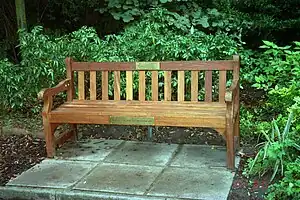
The internet bench, also known as the "cyber seat",[1] was the first internet-enabled bench. It was installed in Bury St. Edmunds, Suffolk, England, on 6 August 2001.[2] It was customized to allow seating for four people at a time who could plug their laptops into modem jacks for free. The bench became popular as a picture-taking location and was also covered by international television crews. With the advent of Wi-Fi, the bench was deactivated. It holds a Guinness World Record for being the "oldest internet bench".
Description
The internet bench was installed in the Abbey Gardens in Bury St Edmunds by MSN (owned by Microsoft) with the support of the St Edmundsbury Borough Council.[3][4] It supported four people at a time who could plug their laptops into provided modem jacks for free.[3] MSN said they chose Bury St. Edmunds after receiving "applications from local authorities around the country".[4] It cost about £60 for the bench and £30 for the modem.[1] MSN agreed to pay for the modem for three months, after which it was the local council's responsibility to pay if they wanted to continue the project.[1]
History
The first user was Brian Bagnall, mayor of Bury St. Edmunds.[5]
During its first days, the bench was vandalized when someone tried to "block one of the modem plugs".[6][7]
BBC News reported that on first few days of the launch, two teenagers discovered that the bench could be used to make free international calls, so they phoned the local council to tell them about the problem, and also tried to reach Bill Gates but were only able to reach his secretary.[8][9][10] After that, engineers disabled the ability to make long-distance calls.[9]
Ann Clarke, a local council spokeswoman, said that people were fascinated with the bench; according to her, TV crews from Japan and Korea showed "intense media interest".[9] She added that people would come to the bench just to take pictures with it.[9] The bench was regularly patrolled and the garden where the bench was located was locked at night to prevent vandalism.[7] Owing to the advent of Wi-Fi, the bench was deactivated, and now has a plaque stating that while it was innovative in 2001, it has been "superseded".[11]
Guinness World Record
It holds a Guinness World Record for being the "oldest internet bench".[2]
Gallery
 The bench's top plaque before it was disconnected
The bench's top plaque before it was disconnected The bench's bottom plaque
The bench's bottom plaque Two of the modem jacks on the bench
Two of the modem jacks on the bench The bench in 2006
The bench in 2006
References
- 1 2 3 Sapsted, David (31 December 2001). "Cyber seat brings internet out in the open". The Daily Telegraph. Archived from the original on 30 June 2020. Retrieved 30 June 2020.
- 1 2 "Oldest internet bench". Guinness World Records. Archived from the original on 30 June 2020. Retrieved 30 June 2020.
- 1 2 "The world's first online park bench". Cambridge Network. Archived from the original on 30 June 2020. Retrieved 30 June 2020.
- 1 2 "Park bench goes online". BBC. 6 August 2001. Archived from the original on 14 February 2015. Retrieved 30 June 2020.
- ↑ "Bury St Edmunds: Shrine Of A King, Cradle Of The Law – And Now Home Of The World's First Internet Bench". Local Government Chronicle (LGC). 7 August 2001. Archived from the original on 30 June 2020. Retrieved 30 June 2020.
- ↑ "Internet Bench' Makes Free International Calls". ispreview.co.uk. Archived from the original on 30 June 2020. Retrieved 30 June 2020.
- 1 2 "Internet bench has interesting first week". Canadian Broadcasting Corporation. Archived from the original on 30 June 2020. Retrieved 29 June 2020.
- ↑ "All Is Revealed on the Web!". The Westmorland Gazette. Archived from the original on 30 June 2020. Retrieved 30 June 2020.
- 1 2 3 4 "Bad start for internet bench". BBC. 9 August 2001. Archived from the original on 30 June 2020. Retrieved 30 June 2020.
- ↑ Sapsted, David (9 August 2001). "Bury's cyber seat attracts two hackers". The Daily Telegraph. ISSN 0307-1235. Archived from the original on 30 June 2020. Retrieved 30 June 2020.
- ↑ "This location marks the site of the world's first internet bench. The 2001 technology (dial-up internet connection), whilst innovative at the time, has since been superseded". Atlas Obscura. Retrieved 30 June 2020.